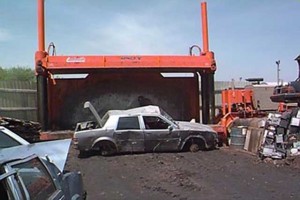
Could the proposed cash-for-clunkers program revive the U.S. auto industry?
Cars, trucks and crossovers are lasting longer than ever, according ot the latest research. Too long, perhaps, giving motorists one less reason to go back to their local dealer during the current economic crisis.
“Manufacturers have done such a good job improving long-term durability,” says Neal Oddes, an executive with the market research firm, J.D. Power and Associates,” that consumers are keeping their cars longer than they have in the past.”
Is that why sales have plunged from more than 17 million a year, earlier this decade, to barely 10 million, at current rates? No, but it certainly is a factor. So, short of sending the repo man around to tow the oldest cars away, what can be done to spur demand? German lawmakers scored a direct hit, earlier this year, when they introduced a clunker-for-cash program. Significantly, Germany was the only major market in Europe that posted an increase in new car sales, last month, but the increase appears to have boosted the sales of non-German brands more.
Formally known as a scrappage program, lawmakers in other parts of Europe are taking a closer look. And, here at home, Rep. Betty Sutton, an Ohio Democrat, has introduced a bill of her own that would offer an owner a voucher worth between $3,000 and $5,000 to crush or otherwise recycle a car dating back to at least the 2001 model-year.
Significantly, the new vehicle it’s replaced with would have to be built here in North America, achieve a minimum 27 mpg, for a car, or 24 mpg, for a light truck. And it could not be priced at over $35,000.
Despite the emphasis on fuel efficiency, the proposal would actually eliminate some of the highest-mileage models now on the market, such as the foreign-made Toyota Prius and Honda Fit, for example.
So, while, “We believe this type of program could have a materially positive effect on demand, passage is believed to be a long-shot,” cautions Deutsche Bank’s auto analyst, Rod Lache. “Foreign automakers,” he adds, “and the environmental lobby are likely to protest.
Cost, however, could be an even bigger obstacles. If such a bill caused as many as 2.2 million people to scrap their clunkers, calculates Lache, that would cost the government, he estimates, about $9 billion.
Two other scrappage plans were offered up during the debate over the Obama Administration’s economic stimulus package. And getting a standalone bill onto the books could prove even more of a challenge, observers warn. But considering the success of the German model, there may be reason for some hope.
